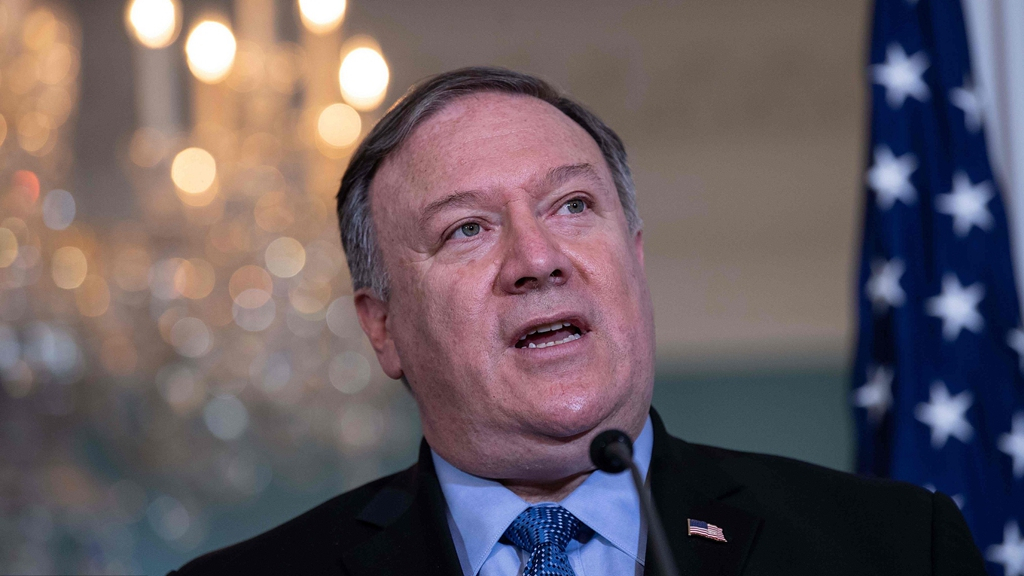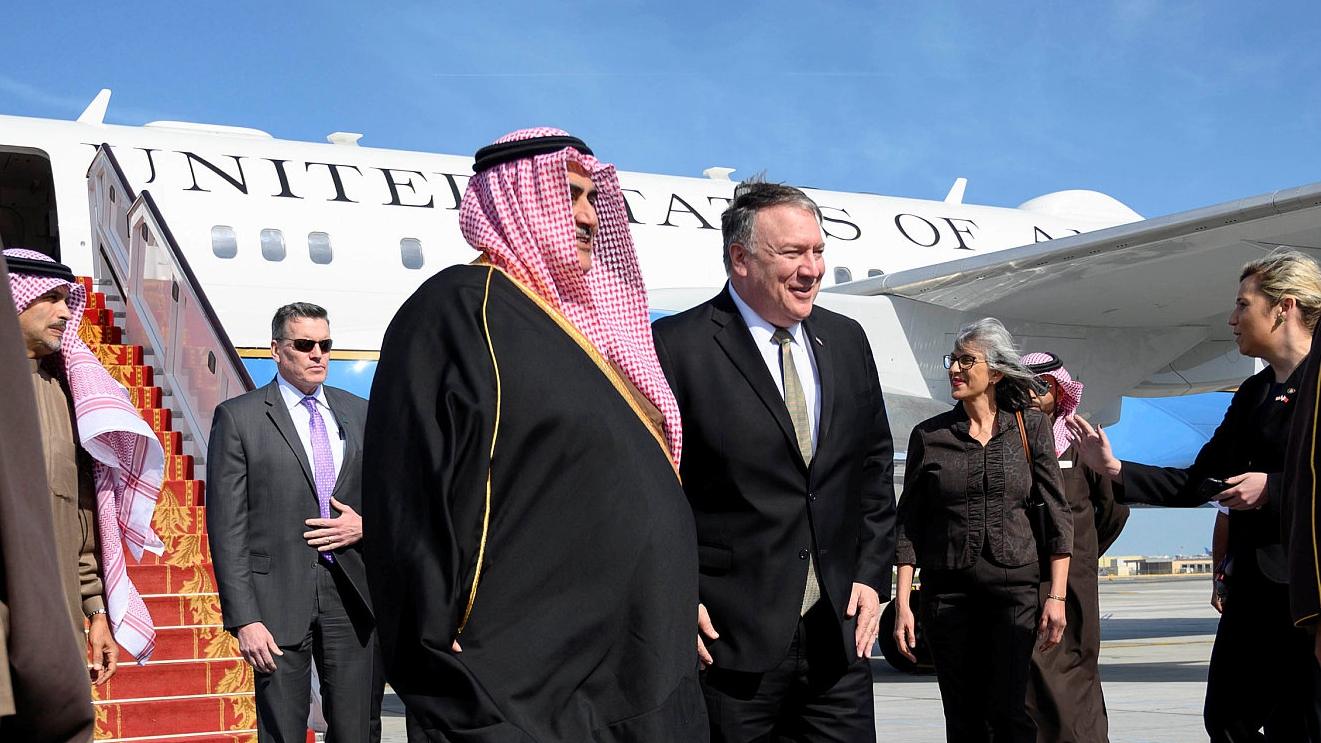
Editor's note: Bradley Blankenship is a Prague-based American journalist, political analyst and freelance reporter. The article reflects the author's opinions, and not necessarily the views of CGTN.
Trita Parsi, the Executive Vice President of the Quincy Institute, published an interesting column on September 16 that argues that the faction of the Donald Trump administration aligned with Secretary of State Mike Pompeo is working on a so-called October Surprise – "a confrontation with Iran that will be cast as both defensive and lawful," as he puts it.
This is a very interesting assertion as it certainly fits into what's believed to be the goals of the Trump administration and could see them through even into a possible Joe Biden administration by applying "maximum pressure" on Iran. Such a confrontation, though certainly risky, could be just the political win the administration needs if pulled off correctly.
The exact course of events that could take place is quite straightforward. On August 27, Pompeo tweeted that the 30 day period to snapback Union Nations Security Council (UNSC) sanctions on Iran would end on September 20 of this year. As Parsi notes, the entire UNSC, save for the Dominican Republic, rejected Washington's legal standing to move forward with the snapback mechanism in the Joint Comprehensive Plan of Action or the "Iran nuclear deal" given that it left the agreement.
This would, as Parsi continues, entail that Washington would enforce these UN sanctions (that were denied by the UNSC) with "U.S. warships attacking and confiscating Iranian cargo ships in international waters — as well as non-Iranian vessels suspected of carrying Iranian goods." The entire UNSC, and pretty much every country on the planet, would reject these actions as violations of international law.
Unfortunately, the U.S. has quite a long track record of unilateral actions, including sanctions, direct military confrontations and other flagrant acts that have accelerated in scope under the Trump administration. Last month, the U.S. seized four tankers allegedly filled with Iranian fuel en route to Caracas in a transparently criminal act aimed at destabilizing both Iran and Venezuela.
Parsi predicts that, after the U.S. moves to enforce these non-existent sanctions, the possibility of retaliation from Iran could become more likely. This would give the Trump administration the right to claim defense in what would probably be an incongruent response, thus legitimizing the escalation to the American public.
There is reason to believe that this could help Trump. The American public tends to rally around presidents in wartime, especially if that war is seen as one of defense. The media has also primed the public to see Iran as a belligerent foe, with seemingly no legitimate claim to actions that defend its sovereignty.
Parsi draws attention to a recent story that was leaked to the press about an alleged Iranian plot to assassinate the U.S. ambassador to South Africa. Without going into too much detail here, he brilliantly details how each and every detail of the story is suspect and why it is a clear attempt to spread disinformation to prep for a confrontation.
But, I would argue, a direct military confrontation falls totally out of line with president Trump's other campaign strategy of trying to cast himself as a peacemaker. After all, that was the point of recent peace deals between the United Arab Emirates (UAE) and Bahrain with Israel, as well as the Kosovo-Serbia agreement, which subsequently landed him two Nobel Peace Prize nominations.
He has made clear several times that he would like to court progressive, non-interventionist voters like those who were aligned with Vermont Senator Bernie Sanders during the Democratic primaries. This is a very hopeless strategy, but one that Trump and his team are taking quite seriously nonetheless.
The public is also quite skeptical of foreign intervention much more than in the past. Non-intervention is a rallying cry for progressive voters and also for many elements of the political right – for very different reasons, of course.
It's been alleged that Fox News' Tucker Carlson, who is one of the country's most watched television personalities (and a white supremacist), even played a role in quelling the last major feud between the U.S. and Iran sparked by the drone assassination of Iranian general Qasem Soleimani.

U.S. Secretary of State Mike Pompeo welcomed by Bahraini Foreign Minister Khalid bin Ahmed Al Khalifa after arriving at Manama International Airport in Manama, Bahrain, January 11, 2019. /VCG
U.S. Secretary of State Mike Pompeo welcomed by Bahraini Foreign Minister Khalid bin Ahmed Al Khalifa after arriving at Manama International Airport in Manama, Bahrain, January 11, 2019. /VCG
On his show, Carlson called for de-escalation of the situation that ensued and appealed to the presidents' dovish sensibilities. Carlson has clout with the president personally and frequently criticizes foreign intervention, even blasting John Bolton to his face on one famous occasion.
"I continue to believe the president doesn't want a full-blown war," Carlson said at the time after the assassination of Soleimani. "Some around him might, but I think most sober people don't want that."
The "some around him" that Carlson referred to probably includes Mike Pompeo. The deeply ideological secretary of state has amassed more power than any American head diplomat since Henry Kissinger and has managed to elbow out National Security Advisor Robert O'Brien and Defense Secretary Mark Esper in foreign policy say. This is mainly because of his deep devotion to President Trump that few can match.
But he has a higher master. Pompeo is a deeply sincere Christian, having been a former deacon and preacher in the Evangelical Presbyterian Church – a church that believes in the second-coming of Jesus Christ and the "end times" once prophecies have been fulfilled, one of which being the return of all Jews to the Holy Land. This is admittedly a major ideological framework for his Middle East policy.
Trump needs evangelicals to turn out for him in November, but he is not a man of God. This is why Mike Pence was chosen as his vice president in 2016 – to shore up the evangelical vote. This group is undoubtedly behind him already, and if he simply pens a new peace agreement every week from here until election day between Israel and an Arab country then he will have his pro-Israel (and thus pro-evangelical) wins without needing to launch a military confrontation with Iran, who is Israel's main foe in the region.
On the other hand, Pompeo seems to have earned free rein on the Iran issue. The leaks involving the Iranian assassination plot undoubtedly came through his agency without the president even being aware and he is very clear taking the helm on belligerent diplomacy. This is an ideological motivation from Pompeo's perspective, not a political one, because he would like to see "maximum pressure" on Iran regardless of who wins in November to advance his worldview.
But would Trump actually follow Pompeo into ushering in this rapture? Doubtful. Trump has backed down from every serious military escalation that his administration has faced, and the buck ultimately stops with him. Especially at this moment, when he is pinned against the wall with so much scrutiny domestically, a direct military confrontation would probably be too costly of a gamble and certainly less practical than trying to go the peacemaker route.
One should, however, never count out the unparalleled hypocrisy of Donald Trump. September 20 and onward will be a very crucial time for stability in the Middle East and analysts will be watching carefully.
(If you want to contribute and have specific expertise, please contact us at opinions@cgtn.com.)